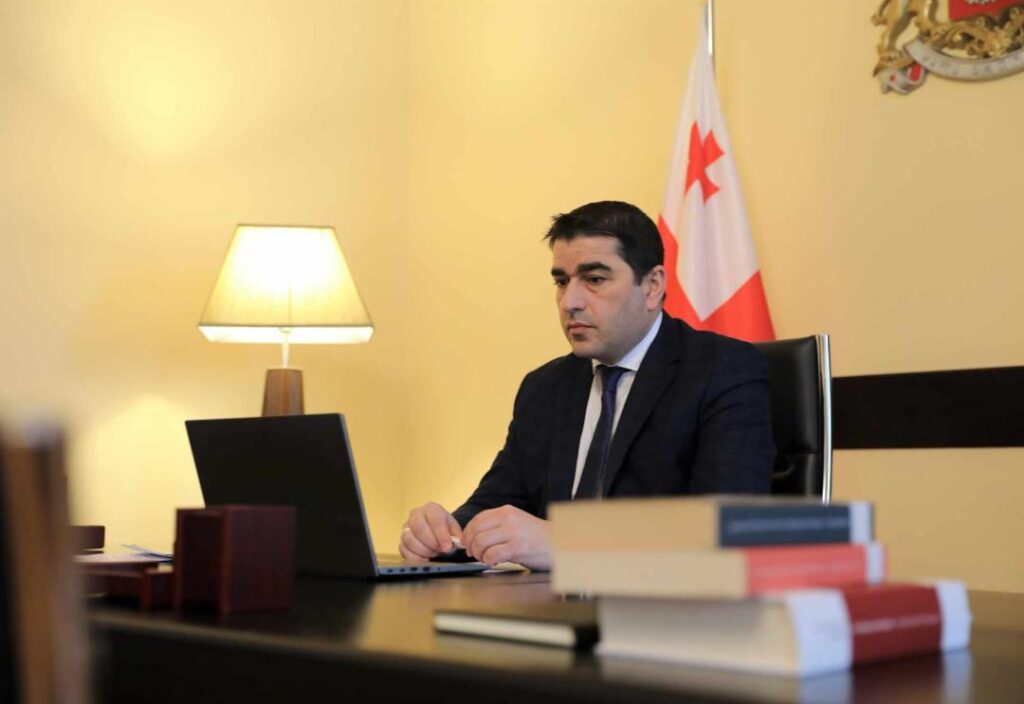
“I am thankful for the opportunity to address you today, reflect on recent developments in Georgia and shed some light on an issue that was mystified and stigmatized many times,” said Georgian Parliament Speaker Shalva Papuashvili in his online intervention at the PACE Standing Committee.
Shalva Papuashvili spoke about challenges facing Georgia, the need to adopt the law On Transparency of Foreign Influence, internal and external factors and remarked that the Georgian law was less rigid than those adopted in other countries.
Here is the Speaker’s speech as delivered:
“Dear President,
Distinguished members of the Standing Committee,
Ladies and Gentlemen,
Concealed foreign interference poses threats to national interests of many countries around the world. In response, they are desperately trying to find solution to this ever-increasing challenge and secure integrity of their political, economic and security systems.
Georgia is no exception. Georgia’s geographic location and complex regional setting further aggravate the situation and leave my country and society vulnerable. We continue to uncover numerous shadow schemes that fuel polarization and undermine state institutions in Georgia. We cannot afford to be disarmed in the crosswinds of these emerging threats. It is not an either-or situation but rather the absolute necessity in face of threats.
If non-profit organizations (NPOs) in Georgia are to engage in decision making at all levels and enjoy influence over public life, they must provide basic standard of transparency – population must know who stands behind any actor. This is true to state institutions, this is true to political parties, this is true to civil servants, and this must be true to non-profit organisations too. Financial transparency of all these key actors of decision-making circle is a basic principle.
Despite my multiple attempts since last year to persuade both international donors and local recipients to voluntarily ensure transparency to the public, these efforts have been futile. Despite recognising the flaws and legitimate concerns, no practical steps have been made to improve the transparency.
The Law on Transparency of Foreign Influence addresses this problem of non-transparent foreign funding in a streamlined and proportionate way, fully respecting fundamental human rights and political freedoms.
Ladies and gentlemen,
What continues frustrating us, is the stigmatization of this Law by internal and external actors as well as their tendency for jumping to quick conclusions. From the very beginning, the law was labelled as “Russian.” “Russian law” is a discrediting political metaphor to stigmatize legislation and cause public outcry.
In fact, whether somebody likes it or not, other international analogues are much stricter since their legal provisions are stricter than the Georgian version. Moreover, there is no mention of a “foreign agent” in the Law but the “organization pursuing the interest of a foreign power”. It resembles the European Union’s wording “organization carrying interest representation on behalf of third countries” suggested in European Commission’s proposal for a Directive.
We have studied the practice of the European Court of Justice and European Court of Human Rights and this law is compatible with international human rights standards; it imposes no restriction on foreign funding or prohibition on accessing foreign funds whatsoever; it does not require prior authorization of financial transactions; it does not envisage funding controls or administrative dissolution; and it does not envisage criminal liability. The law, by no means, restricts NPOs from seeking, receiving and using foreign funding, nor does it restrict their legitimate activities such as human rights and democracy promotion. In Georgia, NPOs are free and will be free after the adoption of this Law.
In turn, the law introduces a single, simple and non-burdensome obligation for non-profit organisations to declare annual finances if their foreign funding is more than 20%. Natural persons are not subject to the law.
This is the absolute minimal and proportionate interference. There is no other lesser obligation on transparency in any other legal jurisdiction across the globe.
The Law on Transparency of Foreign Influence will raise level of responsibility and accountability of NPOs. These improvements will ameliorate the integrity of the political and electoral system in Georgia and allow more inclusive participation of non-profit organizations in public policy-making.
Dear Colleagues,
It was for these reasons that we do not share the opinion of the Venice Commission in components of legality, legitimacy or necessity and proportionality, duly communicated to Venice Commission experts in our meetings. After-all, we cannot understand how transparency can be non-democratic and non-European?!
Therefore, the veto of the President of Georgia will be overcome and this Law will come into force.
Spreading disinformation against Georgia is not new for us. On one of such notorious cases of disinformation – former President Mikheil Saakashvili’s criminal sentences – ECHR just yesterday ended all speculations about his so called “political prisonership”. This myth was mentioned numerous times in resolutions and/or statements of various organisations and politicians. Even Parliamentary Assembly of Council of Europe voted for the Resolution 2463 of 2022 where he is portrayed without a single factual argument as a ‘political prisoner’. Therefore, it was no surprise that yesterday’s judgement of ECHR once again debunked myths and disinformation about him and all such resolutions. Time has clearly demonstrated the fact that despite aggressive disinformation campaigns, Georgia and its institutions are maturing on their democratic consolidation path.
I am confident that much like all previous cases of disinformation campaigns, the time will show only one thing about the Law on Transparency of Foreign Influence – its only purpose is to maintain integrity of political, economic and security systems and to strengthen resilience of Georgia in face of threats.
We are always ready for constructive and fact-based dialogue and for listening to critical assessments,” he said.





